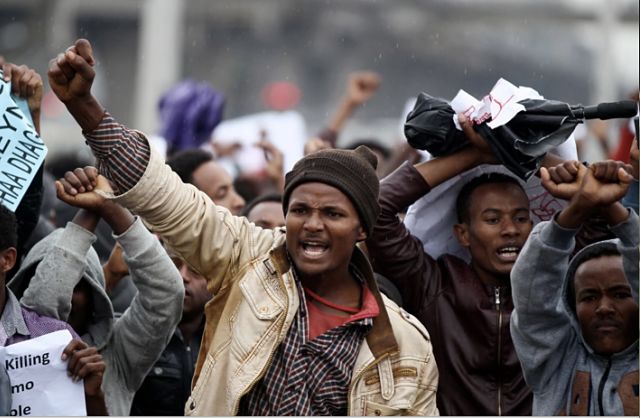 Protesters demonstrate over what they say is unfair distribution of wealth in Ethiopia at Meskel Square in Addis Ababa on Aug. 6. (Tiksa Negeri/Reuters)
Protesters demonstrate over what they say is unfair distribution of wealth in Ethiopia at Meskel Square in Addis Ababa on Aug. 6. (Tiksa Negeri/Reuters)
By Editorial Board
OVER THE weekend, Ethiopia reminded the world of how it treats those who dare demonstrate against the government. At least 90 protesters were shot and killed by Ethiopian security forces in the regions of Oromia and Amhara. As demonstrations unusually reached into the capital of Addis Ababa, the regime censored social media posts and blocked Internet access.
This fresh outburst of repression follows months of unrest in the Oromia region over government plans to expand the Addis Ababa capital territory into the lands of the Oromo, the country’s largest ethnic group. According to Human Rights Watch, Ethiopian security officers have killed more than 400 people in clashes over the Oromia land dispute since protests broke out in November. Tens of thousands more have been detained. The clashes represent the worst ethnic violence that Ethiopia has seen in years. That the unrest is spreading to regions beyond Oromia underscores the depth of anger against the ruling Ethiopian People’s Revolutionary Democratic Front party.
The weekend’s bloodshed should prompt the West to reconsider its aid to the regime. Ethiopia has been hailed as a model of economic development and touts its progress on global anti-poverty indicators as proof that its “developmental democratic” style is working. But the repeated use of force to silence dissent threatens development by sowing seeds of future unrest.
The United States has long relied on Ethiopia as a partner in the fight against al-Shabab’s terrorism in Somalia and sends the country tens of millions of dollars in development assistance, tiptoeing around Ethiopia’s human rights abuses and resistance to democratic reforms. On Monday, the U.S. Embassy in Addis Ababa remarked that it was “deeply concerned” and expressed its “deep condolences to those who suffered as a result” but stopped short of explicitly urging the Ethiopian government to refrain from using excessive force against its citizens. The Obama administration should encourage a credible investigation into the killings and publicly make clear that Ethiopia’s continued crackdowns are unacceptable.
Read more at The Washington Post »
Protesters have been complaining about economic and political marginalisation. (Photos: Reuters)
—-
Related:
‘A Generation Is Protesting’ in Ethiopia, Long a U.S. Ally (The New York Times)
UPDATE: ‘Nearly 100 killed’ in Ethiopia Protests (BBC News)
Several dozen shot dead in weekend protests across Ethiopia (AP)
In Addis Ababa Security Forces Use Tear Gas to Disperse Protests (Reuters)
What is behind Ethiopia’s wave of protests? (BBC News)
Protests in Ethiopia’s Gonder City Signal Uncertain Future (VOA News)
Protest in North Ethiopian Region Signals Rising Discontent (Bloomberg)
Riots in Gonder Claim Casualties (DW Report — Jul 15, 2016)
Join the conversation on Twitter and Facebook.

























